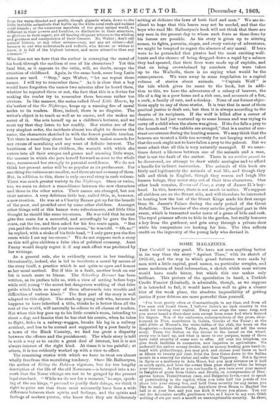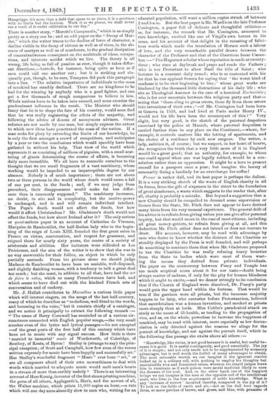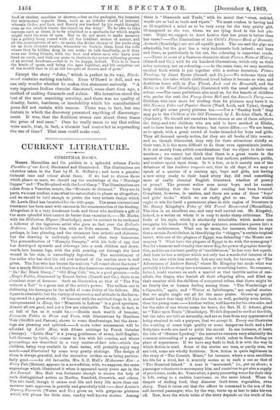SOME MAGAZINES.
Tun Cornhill is very good. We have not seen anything better in its way than the story "Against Time," with its sketch of 1863-66, and the way in which grand fortunes were made by men with a little capital, good names, no particular scruples, and some modicum of local information, a sketch which most writers would have made bitter, but which this one makes only brilliant. This picture of the speculation in hand, a Turkish Credit Foncier (Limited), is admirable, though, as we suppose it is intended to fail, it would have been well to give a clearer hint of the weak place, the absolute impossibility of getting justice if your debtors are more powerful than yourself.
"Fre been pretty often at Constantinople in my time, and from all I've seen and heard there, I believe there's no such country in the world for turning over capital. Every one ainga the same song, and you never beard a discordant note except from some fool who's burned his fingers. Men of the embassies, correspondents of the press, shop- keepers in P0111, merchants in Galata, Greeks of the Fatter; at the table d'hote at Misseri's, the whist-tables of the club, the boats on the Bosphorus,—Armenians, Turks, Jews, and Infidels all tell the same story. From the Sultan on the throne to the hamal on the wharf, every one is hard up, and what is more to our purpose, many of thew have valid security of some sort to offer. All over the kingdom, we give fresh facilities to commerce, new impulses to agriculture. We undersell the native money-lender, and as money-lending goes hand-in- hand with philanthropy, you may pick and choose your loans on laud at fifteen to twenty per cent. from the Iron Gates down to the Salina mouth in a country far richer and safer than Tipperary. Not a fig-tree in Syria or a mulberry in Asia Minor, but you may advance on it half as much again, and have the owner bless your charity when he brings your interest. As fast as you can handle it, you turn over your money in freights of grain from Galatz and Ibraila, on consignments of Hun- garian horses, Transylvanian oxen, and Bulgarian fowls,—not to speak of pawnbroking in the capital, when you take half the jewels of the place into your strong box, and hold them security for any terms you like to make. In discounting : Anywhere from Brusa to Bagdad the ball is at your feet, and you can kick it where you please. You cut out the Armenian saraffs, gentlemen who, as I know to my cost, think nothing of six per cent. a month on unexceptionable security. In short,
Hemprigge, it's more than a field that opens to ns there, it is a province with no limits but the horizon. Work it as we please, we shall never see a tenth of it under cultivation in our day."
There is another story, " Moretti's Campanula," which is as simply pretty as a story can be ; and an odd paper on the "Decay of Mur- der," which the writer traces to the decline of force of character, a decline visible in the decay of virtues as well as of vices, in the ab- sence of martyrs as well as of murderers, in the gradual dissipation of concentrativeness consequent on the multitude of ideas, occupa- tions, and interests amidst which we live. The theory is all wrong, life being as full of passion as ever, though it takes differ- ent directions,—hatreds, for instance, being quite as keen as if men could call one another out ; but it is striking and elo- quently put, though, to be sure, Tennyson did pack this paragraph into a line. "The relative importance of individuals to the mass of mankind has steadily declined. There are no kingdoms to be had for the winning by anybody who is a good fighter, and can get a few thousands of rough companions to believe in him. Whole nations have to be taken into council, and none exercise the predominant influence in the result. The Minister who should fancy that he is to shape the fate of his country, would soon find that he was really registering the edicts of the majority, and following the advice of dozens of anonymous advisers. Great reforms are not made by one man, but simply express the extent to which new ideas have penetrated the mass of the nation. If a man seeks for glory by extending the limits of our knowledge, he is only the first amongst a crowd of competitors, and anticipates by a year or two the conclusions which would speedily have been gathered in without his help. That view of the world which represents it as consisting of millions of pigmies, with a small scat- tering of giants determining the course of affairs, is becoming daily more incredible. We all have to reconcile ourselves to the thought that we are small fragments of a vast machinery, whose working would be impeded to an imperceptible degree by our absence. Nobody is of much importance ; there are not above two or three persons in the world whose death would cause a fall of one per cent. in the funds ; and, if we may judge from precedent, their disappearance would make far less differ- ence than is commonly supposed." The machinery increases, no doubt, in size and in complexity, but the motive-power is unchanged, and is and will remain individual intellect. The Pope's death would not affect the funds, but how would it affect Christendom ? Mr. Gladstone's death would not affect the funds, but how about Ireland after it? The only serious or quasi-serious paper is an account of Catherine de Vivonne, Marquise de Rambouillet, the half-Italian lady who in the begin- ning of the reign of Louis XIII. founded the first great salon in France on virtue, conversation, and respect for grammar, and reigned there for nearly sixty years, the centre of a society of aristocrats and abilities. Her imitators were ridiculed as Les Precieuses, and the aim of the writer is to show that she was in no way answerable for their follies, an object in which he only partially succeeds. From his picture alone we should judge Madame de Rambouillet to have been an amiable, well-disposed, and slightly finicking woman, with a tendency to talk a great deal too much ; but she must, in addition to all that, have had the art de faire is salon, which so many Frenchwomen have had, and which seems to have died out with the kindred French arts of conversation and of cookery.
Mr. J. Hullah contributes to Macmillan a curious little paper which will interest singers, on the songs of the last half-century, many of which he describes as "melodious, well fitted to the words, and becoming to the voice," but it consists chiefly of a catalogue, and we notice it principally to extract the following remark :- " The name of Barry Cornwall has reminded us of a curious cir- cumstance connected with English popular songs,—the very small number even of the lyrics and lyrical passages—his not excepted —of the great poets of the first half of this century which have been set to music with any signal success. How little is there married to immortal' music of Wordsworth, of Coleridge, of Southey, of Keats, of Byron ! Shelley is (strange to say) the prin- cipal exception; of Scott and Campbell, how few even of the verses written expressly for music have been happily and successfully set." Has Shelley's wonderful fragment " Music" ever been " set," or are all composers afraid of their own unworthiness to deal with words which married to adequate music would melt men's hearts in a stream of more than earthly melody ? There is an interesting account of Herr Kcenig, inventor of the first steam printing machine, the germ of all others, Applegarth's, Hoe's, and the newest of all, the Walter machine, which prints 11,000 copies an hour,—a rate which will one day seem absurdly slow to men who, writing for an
educated population, will want a million copies struck off between 2 and 5 a.m. But the best paper is Mr. Ward's on the late Professor Conington, a paper full of delicate and thoughtful criticism— as, for instance, the remark that Mr. Conington, armoured in rare knowledge, exulted like one of Virgil's own heroes in his arms, and his account of that delight in the recasting of felici- tous words which made the translation of Horace such a labour of love, and the very remarkable parallel drawn between the character of the Professor and that of the illustrious Isaac Casau- bon :—" The Huguenot scholar whose reputation is made at twenty- three ; who rises at daybreak and prays and reads the Fathers ; who is too Protestant to allow Basil the title of Saint ; who lectures in a constant daily round ; who is so contented with his lot that he can applaud Seneca for saying that ' the worst kind of madness is to be ever beginning to live ; ' whose great works are hindered by the thousand little distractions of his daily life ; who sits as Theological Assessor in the case of a heretical Eucharistie ; who is for ever uncertain between this religious party and that— seeing that these cling to gross errors, those fly from those errors into inventions of their own ; '—if Mr. Conington had been born at Geneva in 1559, and had lived at Paris under Henry IV., would not his life have been the counterpart of this ? " Very slight, but very good, is the sketch of the paternal despotism exercised by the police at Munich, where paternal despotism is carried further than in any place on the Continent,—where, for example, it controls matters like the letting of apartments, and the choice of a residence by each new surgeon. The writer, a lady, satirizes it, of course ; but we suspect, in her heart of hearts, she recognizes the truth that a very little more of it in England would be a great good ; that an authority, for example, to whom one could appeal when one was legally robbed, would be a con- solation rather than an oppression. It might be a bore to present oneself for a passport once a year; but imagine the luxury of summarily fining a landlady for an overcharge for coffee!
Fraser is rather dull, and its best paper is perhaps the dullest. It is a very striking sketch of the waste of English charity in all its forms, from the gift of sixpences in the street to the foundation of great almshouses, a waste which suggests to the reader that, after all, charity is probably a mistake. But beyond a suggestion that a new Charity should be compelled to demand some supervision or licence from the State, Mr. Fitch does not appear to have derived many hints from his very unusual experience. The general drift of his advice is to refrain from giving unless you can give after personal inquiry, but that would mean in the case of most citizens, including all great money-getters, to refrain from giving at all, and this deduction Mr. Fitch either does not intend or does not venture to draw. His account, however, may be read with advantage by men who desire to know whether the distrust of the Charities so steadily displayed by the Press is well founded, and will perhaps do something to convince them that when Mr. Gladstone proposed to tax the Charities he was really refusing heavy bounties from the State to bodies which were most of them wast- ing the means they derived from private individuals. The paper on the controversy between Pusey and Temple has too much sceptical scorn about it for our taste—doubt being always matter of sadness, if only for the pity for human blindness which it ought to excite,—and we demur strongly to its conclusion that if the Church of England were dissolved, Dr. Pusey's party would gain the upper hand within the fortress. That would be true if the garrison were all priests, but the immense majority happen to be laity, who centuries before Protestantism, believed that sacerdotaliarn was a human invention, and mocked at priests more sharply than at lords. Miss Cobbe's paradoxical attack on study as the cause of ill-health, as tending to the propagation of vice, and as, on the whole, powerless to increase the happiness of mankind, may be read with interest, more especially as her denun- ciation is only directed against the reasons we allege for the pursuit of knowledge, and not against the pursuit itself, which in the following fine passage she exalts above all others :-
',Knowledge, like virtue, is not good because it is useful, but useful be- cause it is good. It is useful contingently, and good essentially. The joy of it is simple; and not only needs not to be supplemented by accessory advantages, but is well worth the forfeit of many advantages to obtain. The most miserable wretch we can imagine is the ignorant convict locked up in a solitary cell, with nothing to employ his thoughts but unattainable vice and frustrated crime, whereon his stupid judges leave him to ruminate, as if such poison were moral medicine likely to cure the diseases of his soul. And, on the other hand, one of the happiest beings we can imagine is the man at the opposite end of the intellectual scale, who lives in the free acquirement of noble knowledge. What is any increase of sorrow' incurred thereby, compared to the joy of it ? To look on the fields of earth and air,—not as the dull boor regards them, as mere patches of brown, and green, and blue, with promises of food or shelter, sunshine or shower,—but as the geologist, the botanist, the astronomer regards them, each as an infinite world of interest, wherein Order, and Law, and Beauty are tracked by his rapid thought, even as the swallow traces the insect on the wing! To be able to take surveys such as these, is to be admitted to a spectacle for which angels might envy the sons of men. But to do yet more, to make memory like a gallery hung round with all the loveliest scenes of nature, and all the masterpieces of art ; to make the divine chorus of the poets sing for IN their choicest strains, whenever we beckon them from the cells where they lie hidden deep in our souls: to talk familiarly, as if they were oar living friends, with the best and wisest men who have ever lived on earth, and link our arms in theirs in the never-withering groves of an eternal Academe,—this is to be happy, indeed. This is to burst the bonds of space, and bring the ages together, and lift ourselves out of the sordid dust to sit at the banquet of heroes and of gods."
Except the story "John," which is perfect in its way, Black- wood contains nothing readable. Even O'Dowd is dull, and we can only wonder whether he makes this statement seriously. "A very ingenious Italian chemist discovered, some short time ago, a method of making diamonds and rubies. His invention stood the test of the most searching scrutiny, and there was no quality of density, lustre, hardness, or insolubility which his manufactured gems did not sustain with success. There was, in fact, but one feature in which the discovery presented anything of discourage- ment. It was, that the fictitious stones cost about three times the price of real ones." Does he really mean to say that rubies were made, that, in fact, a chemist had succeeded in superseding the use of time? That man could make coal.




































 Previous page
Previous page